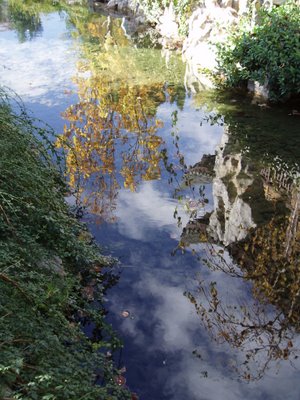Transcendant function
 Silkenvoice" border="0">
Silkenvoice" border="0">I was sorting through this weekend's photos and stumbled across this one. Something about it really appeals to me...
Which is water, which is sky? What is real and what is reflection? The beauty of such illusions is that they simultaneously provide us the opportunity to suspend disbelief (holding two conflicting perceptions in mind), and to recognize the illusory nature of our perceptions.
Last week I remarked how bothered I was by my awareness that I have become a walking contradiction. I later had a conversation with a friend who remarked on my ability to hold two seemingly paradoxical or conflicting concepts in my mind and see them both as being valid. Then, in my reading on Jung, I stumbled upon his mention of something called the "transcendent function:"
Transcendent function. When there is full parity of the opposites, attested by the ego's absolute participation in both, this necessarily leads to a suspension of the will, for the will can no longer operate when every motive has an equally strong countermotive. <...> a damming up of vital energy results, and this would lead to an insupportable condition did not the tension of opposites produce a new, uniting function that transcends them. (Jung)
A couple of weeks ago I was babbling about fluidity, flexibility and adaptability as characteristics that are key to experiencing something as transformational rather than tragic. According to the Jungians, it seems that, in order for us to function under the tension that the awareness of opposites engenders, we create a transitional, symbolic, expansive, transcendent, play space in our psyche. It is in this internal landscape that we hold experiences and perceptions prior to applying meaning to them. The larger this space, the greater the potential to experience the moment as something new, rather than applying old, preconceived meanings to it. We suspend the will, the drive to label and judge, and allow the meanings of experiences to unfold with time, without exerting control. This allows tensions to co-exist in conflict and collaboration until balance or harmony is achieved. It is in this transcendent space that we come to understand that control is an illusion, that our internal realities are subjective, that 'meanings' are ascribed according to our attitudes.
Contradiction. Paradox. Tension of opposites. Transcendent Function. Perhaps this, too is a key to experiencing life as transformational instead of tragic: creating a space in ourselves large enough to hold ideas and experiences in suspension until the meanings arise of themselves, instead of making snap judgements.
It goes without saying that some of us create larger spaces than others. For some, the boundaries of that space are clearly defined, for others, they are limitless. I wonder, is the 'size' of this space related to fluidity, flexibility and adaptability? Do they develop in concert? Which came first? The water, or the sky? I digress. Or it is "regress"?
Ah, the power of illusion to make me think.
(PS: The photo was taken looking down into a pond...and up into the sky. Life from the perspective of the koi.)
Labels: chinese garden, conversation, essay, illusion, nature, philosophy, therapy, transcendence







1 Comments:
You speak of the power to perceive rather than judge -- the power to remain undecided, flexible, unattached...open.
But I also add this caution to your cause. Indecision can lead to immobility. Spontineity can lead to danger.
There is a time for both decision and suspension just as there is a reason for both.
Post a Comment
<< Home